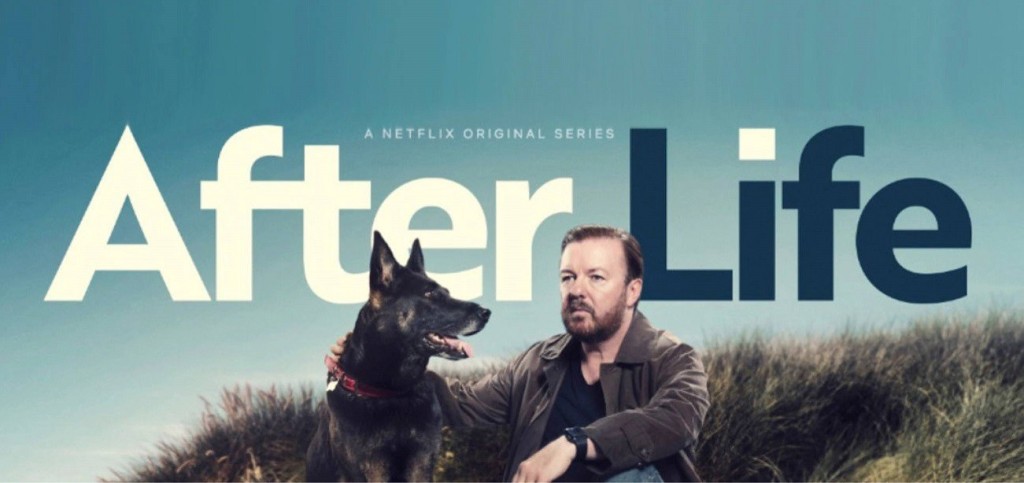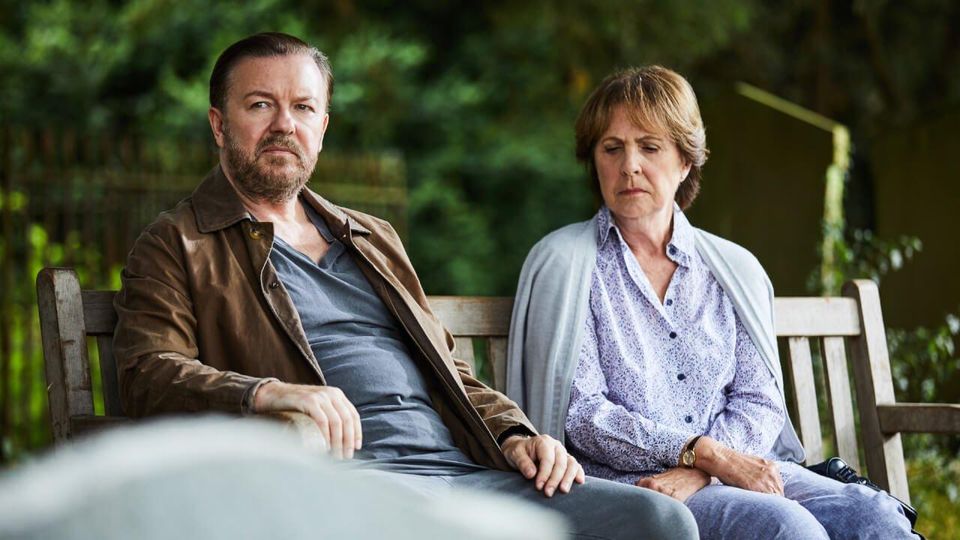Never before have our memories been so easy to recall at the push of a button and with the coronavirus on the loose, grief over recorded memories is a form of suffering for which everyone needs to prepare.
With shows like After Life, it seems that the media anticipated our crisis and provided pre-emptive medicine in the form of entertainment — like an innoculation from the sorrow coming our way or a depiction of the world as it may soon be rather than as it already is.

In After Life, there is a strange numbness that pervades everyone except for the protagonist. He is cursed to feel and think while everyone else has largely disconnected from the painful things in life. Because of their disconnection, they soldier on like almost-happy zombies — almost lobotomized.
When a man whose wife was murdered by some young thugs who hit her with a hammer calls the local paper to report on a Kenneth Branagh shaped water stain in his apartment, there is an understanding that the job of journalists and citizens is to focus on positive, trivial occurences and not to report on what is actually going on. They understand that the purpose of the local paper is to help unseen people feel seen and that focusing news on troublemakers, flashy show-offs, and noisy politicians only makes everyone feel worse. It is much better to focus on those who are struggling in quieter ways.
Maybe life will be like that someday. At the moment, all you have to do is look on the internet to be tramatized by some fresh horror, but the community of After Life seems to be disconnected from awful information and they are content with that. They’d rather give away the illusion of control than use it as a source of sick entertainment.
Because of their contentment and disconnection, the characters in this show come across as barely conscious. They are certainly not politically conscious. When asked who she would invite to a dinner party, one of the characters says “Princess Di, the guy from Carpool Karaoke, Kevin Hart, Michael Jackson..”. When asked what or who she loves, she replies, “Funny memes on Twitter, Kevin Hart.” She is so disconnected and numb that she can’t feel her own pain or see how blinded she’s been. Yet it is hard to see how removing her blindness would be any good for her. When asked to report on a story about a local talent, they visited a fat, unemployed kid who had learned to play a musical instrument with his nose. He was a depressing symbol of hope that brains can grow back despite a poisonous environment.
In a post epidemic world where almost everyone is brain damaged and grieving, this is what you would expect.
In almost every shot, the streets, landscapes, and rooms look strangely empty and spacious. By speaking to our fears, the show is strangely soothing because it assures us that the world will go on even after it has been damaged.
The show asks the question, “Why should we keep on living when we are conscious of the damage and decay surrounding us? Why should we keep on living when our memories of better times are available to torment us at the push of a button? Wouldn’t it be better to forget?” The fat character lives for food. The brother-in-law lives for his family. The care-home worker lives to feel useful to people who can’t fend for themselves. The protagonist keeps going for the sake of his helpless dog.
The messages are: those who are painfully aware need to keep going for the sake of those who aren’t aware because life and awareness spring eternal. Be good and make things better for others. That makes life worth living.
These familiar messages are literally delivered by an old woman on a park bench, but maybe that is the source of knowledge that keeps human civlization going when something like a coronavirus comes along.

Variety is the spice of life and I enjoyed some watermelon, tortilla chips, and salsa today. That is my contribution to civilization for the day, and from an After Life modified perspective, that feels perfectly sufficient. Lowered expectations are nicely liberating.
I made the salsa by throwing whole tomatoes, garlic, red onion, and a jalapeno into a skillet and cooking them until they were slightly charred. Then I threw them into a blender with some salt, pepper, and lime juice. Nothing could be simpler. Well, maybe guacamole is simpler, but I’ll save that for tomorrow.
For today, I will savor After Life’s Jeckyl and Hyde conversations between the man longing for his wife’s love and his psychiatrist longing to fuck anything that moves. For the sake of the show, these character traits were encapsulated in separate people, but we all know that in real life, many men have a bit of both. The show illustrates the role that women play in helping men keep these traits in balance.
This show places a lot of emphasis on the heartache of husbands learning to cope with loneliness in healthy ways rather than by turning into a smelly hoarder or bum or into a nihilistic monster like the psychiatrist, a man who accepts payment for friendship and who pays to disrespect women’s bodies. But even the monsters of the show serve a vital purpose — reminding everyone about what they don’t want to be. The show illustrates that we need to confront our monsters, so that we can keep them from running wild within our selves.
- The office tart shows the wife what will happen to her husband if she doesn’t take care of him.
- The feminist whose husband killed himself shows what will happen to the husbands of women who denigrate them.
- The single mother with the child who won’t grow up shows what will happen to a family if the the child takes so much energy that the husband is not cared for.
- The single psychiatrist who turns to drugs, whores, and alpha-male podcasting shows what will happen to a husband if no one takes care of him.
Helping people see themselves is a vital function of entertainment and if a show reflects an image of a good, wholesome man, we might increase those behaviors in the viewing population of men. If a show reflects an image of women who must take care of their fragile men or risk losing them altogether, we might increase those behaviors in the viewing population of women. With a virus running rampant that damages men’s bodies and brains more than women’s, these sorts of lessons are critical to keep social structures from crumbling so that the next generation of men can grow up strong and mentally healthy.
My husband has been conditioned to live for his work rather than for me, and this used to make me sad, but I’ve learned to accept it and look at the bright side. Work keeps his inner child busy and if he was living solely for me, like the protagonist of After Life did, that would be a lot of responsibility for me. It is nice to be necessary, but it is also nice to have more aspects to my purpose in life. For example, I used to have a career, but today I write and take care of my kids. I suppose I’m a bit curious about what it is like to be in a relationship with an adult who needs me. I feel like I’ve missed out on that so far, but maybe there will be more time for that in the future. The economy has been rather overheated in recent years and when it cools down, there may be more time for a lot of things I haven’t gotten to do before. The coronavirus may change a lot of husbands and wives into people that they’ve never been before. It doesn’t necessarily have to be a bad transformation.
With all of the conspiracy theories or prophecies of doom and transformation that have become popular, this global event must feel like a form of vindication. The conspiracy theorists all knew something was about to happen, they just weren’t sure what it was. Their anonymous prophet had warned them: “Trust the plan. Enjoy the show. Nothing can stop what is coming.” and such vague, quasi-religious predictions can’t help but prove to be true in time. Perhaps allowing such prophecies to spread was a good way to prepare a population to accept imminent change. We all need different forms of preparation for change and After Life seems like it was designed to fulfill that purpose for a mainstream audience.
